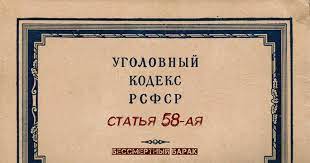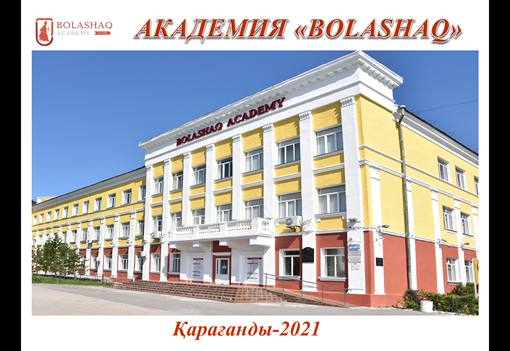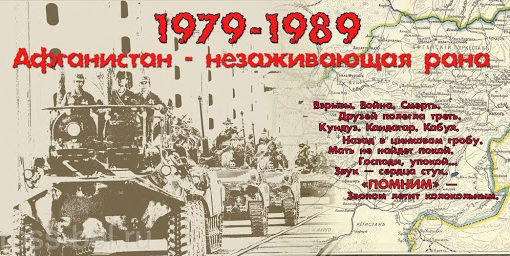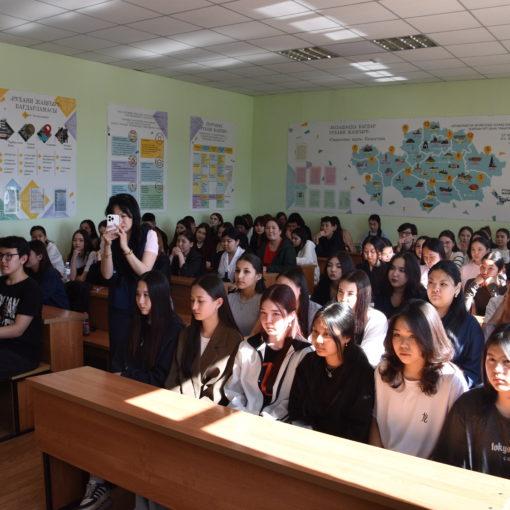
Virtually everyone in the Soviet Union was afraid of being charged under Article 58 of the Criminal Code of the RSFSR.
The Criminal Code of the RSFSR, which contained Article 58, was published in November 1926 and entered into force on January 1, 1927, and did not expire until January 1, 1961. In its original version this article contained 18 paragraphs and was different from the one that was in force in 1930-1940s. Chapter one of the mentioned article, containing 14 paragraphs, was put into action by the Resolution of VTsIK and SNK RSFSR of June 6, 1927; on June 8, 1934 the Resolution of CEC introduced 58-1a – 58-1g. Article 58 was also applied outside the USSR. In the Soviet occupation zone of Germany, Soviet citizens were arrested on suspicion of espionage and could be convicted under Article 58 of the Soviet Criminal Code. In the NKVD special camps in Bautzen, 66% of the prisoners fell into this category.
People convicted under this article were called “enemies of the people. In general, the term had been used in the USSR since 1917 to refer to opponents of the regime – counter-revolutionaries. That was the name given to any person accused of “anti-Soviet activities. The phrase “enemy of the people” was borrowed by the Bolsheviks from the figures of the French Revolution. Ordinary citizens also helped the Soviet state in its struggle against them: the party encouraged denunciation, which became an extremely common practice in the 1930s.
Brief transcripts of the paragraphs of Article 58.
1 – Treason against the Motherland
2 – armed rebellion
3 – Communicating for counterrevolutionary purposes with a foreign country
4 – rendering aid to the international bourgeoisie
5 – bending a foreign state to war
6 – espionage
7 – sabotage
8 – terrorism
9 – sabotage
10 – anti-Soviet agitation and propaganda
11 – Organizational counterrevolutionary activity
At the time of conviction by the Special Board, the “literal articles” corresponding to the paragraphs of Article 58 were used:
CRD (58-1, counterrevolutionary activity)
CRTD (58-1, counter-revolutionary Trotskyist activity)
PS (58-7, suspected espionage);
TN (58-8, terrorist intent);
ACA (58-10, anti-Soviet agitation);
CRA (58-10, counterrevolutionary agitation);
CSIR (family member of a renegade of the motherland).
Prisoners sentenced under Article 58 were called “political” compared to ordinary criminals (“criminals”, “everyday people”). The most widespread punishments were firing squad with confiscation of all property and imprisonment for 10 years with confiscation of all property. Those convicts who managed to avoid being shot served their sentences in the Gulag penal labor camps. Their relatives were also subjected to reprisals.
After their release they were not allowed to settle closer than 100 kilometers from big cities (within the timeframe stipulated by the court). This was called the “hundred and first kilometer”. This distance was measured from the area around Moscow, Leningrad (now St. Petersburg), the capitals of the Union republics (Kiev, Minsk and so on), other large, as well as “closed” cities (Sevastopol, Dnepropetrovsk). During the years of political repressions the family members of the repressed under the 58th article were sent to the 101st kilometer and further. Later, the same deportation applied to non-working citizens (parasites), dissidents, recidivists and those convicted of especially grave articles. In 1953, amnesties were seriously added to this territory. During the Olympics-80 all the untrustworthy were deported there as well.
According to archival research of Oleg Mozokhin for 1937-1938 45,563 people were arrested under the 58th article in the Kazakh SSR, that is less than 1% of the population of the Kazakh SSR. In 1928 mass arrests of former leaders of “Alash Orda” started, most of them were shot later. According to official data 7,614 people were repressed in North-Kazakhstan oblast, 1,465 of them were shot. From 1932 till 1951 in Karaganda region and in Karlag about five thousand people were shot by bodies of NKVD by sentences of “troika” and the 58th article. During the years of Stalin’s government 800 thousand Germans, 102 thousand Poles, 19 thousand Korean families, 507 thousand representatives of the people of Northern Caucasus were deported to the Kazakh SSR. During the years of repressions, more than 5 million people were exiled to camps in Kazakhstan.
Source: https://novoetv.kz




